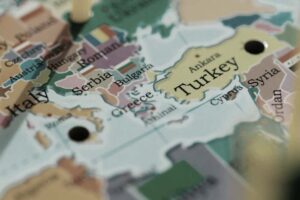
In the 1992 election, Labor and Meretz combined to win 56 Knesset seats and formed a government. In September 2019, the two left-wing parties won a total of 11 seats. Where did all the leftist voters go? Or is it the Left itself that has changed?
Much has been written about the Left’s decline after peace talks with the Palestinians exploded, literally. Waves of suicide bombings in Israel’s cities prompted many leftists to question their views about the possibility of ever securing a peace agreement.
Repeated rounds of negotiations that led nowhere reinforced the despair. By now, many Israelis view the two-state solution as theoretically desirable but practically unattainable. The peace process, once the Left’s main battle cry, is dead. However, there is more to the story.
The decline of the Left was not followed by mass desertion to the right-wing camp. Despite the drop in the number of Israelis who identify as leftists, key rightist causes like settlement annexation remain hotly disputed and deadlocked.
Questions of Identity
Moreover, as the last two elections showed, the Right is only slightly larger than its opponents. So what is going on? Some answers can be found in the center of the political map, and in issues of Jewish and national identity. Or by looking at the curious case of Dr. Gadi Taub.
Taub is a commentator, writer and senior lecturer at The Hebrew University of Jerusalem. A former leftist, in recent years he has become an increasingly vocal critic of the Left while embracing some right-wing positions.
As of late, Taub has been siding with Benjamin Netanyahu as the prime minister battles corruption charges against him. In the same vein, Taub often lashes out at Israel’s justice system, a sacred cow for the Left.
However, Taub is hardly a typical rightist or conservative. In fact, he is an ultra-liberal Tel Avivian who holds some reservations about settlement expansion. Crucially, he mostly aligns with the ideological Right on questions of identity, not policy.
Jewish Nationalism Under Attack
Taub focuses on resisting the attack on nationalism in general, and on Israel’s Jewish character in particular. In doing so, he upholds values that are consistent with the historic views of Israel’s left-wing parties, but less so with current-day sentiments. And here lies the crux of the matter.
The left-wing camp has become far less hospitable to defenders of Israel’s Jewish identity. Instead, the Left adopted a more universalist position that often questions and criticizes the most basic expressions of Jewish nationalism.
These views tend to fuse with strong sympathy and support for non-Jews who are either indifferent or hostile to Israel’s Jewishness, such as Arab Israelis, Palestinians, and migrant workers.
By now, Meretz has become a hotbed of anti-Zionist feelings. Labor maintains a more moderate facade, but some of its key members are associated with the hard left. This likely deters left-leaning voters who would otherwise consider supporting the party.
‘Uneasy With the Word Zionism’
Some of the most devastating criticism against this leftist worldview comes from former Meretz MK Tzvia Greenfeld. While she still considers herself a leftist, the ultra-Orthodox Greenfeld yearns for an entirely different message.
Greenfeld says that anti-Israel and anti-Zionist elements are ruining the Left. While not all leftists identify with these views, radical opinion-makers and activists have huge influence over the entire movement, she told weekly newspaper Makor Rishon in an interview.
“They are uneasy with the national anthem and uneasy with the word Zionism,” she said. “They are uneasy with defining Israel as Jewish. Add this to the endless criticism of the country, its people, and everything that goes on here. I felt that it was becoming unbearable.”
Greenfeld believes that the radical Left’s alienation from most Israelis, and from Israel’s Jewish identity, is pushing more leftist voters to the center.
“The Israeli public’s Jewish identity is very strong, and so is the connection to Jewish history,” she says. “Israelis are unwilling to keep hearing bad things about themselves and their country.”
Blue and White’s Message
And so, many left-wing voters have decided to move to the center. The ultimate expression of this migration came in this year’s elections, where a critical mass of Israelis endorsed Blue and White’s politically moderate but fiercely Zionist message.
And back to Taub. Some leftists find his words irksome and believe that he has veered too far to the right. However, the election results suggest that he is a provocative representative of widely held sentiments. Indeed, many of the left-leaning voters of Blue and White are simply fed up with the Left.
Diehard leftists often condemn members of their camp for allegedly betraying “true left-wing values” in voting for centrist parties. However, by now many Israelis have come to believe that radical leftists are the ones who betray the original spirit of the Left. This popular backlash has left Israel’s left-wing parties in ruins.


